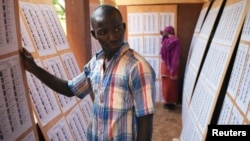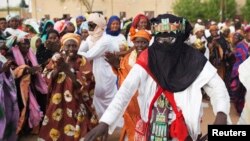BAMAKO —
Malians go to the polls Sunday to elect new government leaders following a March 2012 coup and a subsequent crisis precipitated by a Tuareg secessionist movement. The international community has received some criticism for demanding presidential and legislative elections of an ill-prepared nation as a condition for freeing up $4 billion in aid. Concerns are growing that the elections may entrench recent divisions rather than promote national reconciliation.
Shortly after government offices had opened on a hot, humid Bamako morning, 50 Malians were already gathered at the central elections directorate. Men formed one line. In another stood women and the elderly, including three young mothers cradling infants in brightly colored shawls.
At a window, behind iron bars, an official was entering data into a computer, attempting to understand why no one had received the biometric identity card that will allow them to vote in Sunday’s elections.
Acording to Oumar Sidibe, the directorate’s head of communications, at least 100 people from all backgrounds go to the office each day. He spoke to reporters as an officer began assisting Oumou Sangare, the still cardless wife of a former Malian ambassador to the United Nations.
"This is not our job," Sidibe said. "It should be the job of the ministry of the interior [Ministère Territorial]. He added that they have access to computers that can help people figure out where their electoral cards might be. "We’re simply giving a hand,” he explained.
The biometric election document, which contains the bearer’s fingerprint and a color photo, among other data, is widely known as the ‘Nina’ (National Identity Number) card.
English teacher Brahima Nyere, 59, who is helping his niece obtain her card, said it was hastily introduced for these elections to prevent vote rigging.
“I’ve taken part in almost all past elections," Nyere noted. "The system is not working perfectly. For example, in my district there is no center for distributing cards and I don’t know why.”
A source close to the international election monitoring team, who wished to remain anonymous for not being authorized to speak to the media, tells VOA only 25 percent of all eligible voters in Mali may have received the crucial election ID card. The source warned that this creates “a potentially significant legitimacy deficit” in the election process.
Further complicating the process of election participation in this conflict-ravaged country is the fact that 400,000 Malians remain internally displaced, with 300,000 more living in refugee camps outside the country.
A further 300,000 first-time voters could be ineligible to cast a ballot after not being included in Mali’s last census.
“Mali was considered a model in Western Africa. The coup that occurred last year was unexpected. Everybody knows that it [the census-based system] is not perfect, but it is the least imperfect,” commented Nicolas Teindas, country director of the International Republican Institute. He is helping inform Malians about election procedures.
Bert Koenders, the U.N. special representative to Mali, is more positive. Citing U.N. Development Program figures, he said electoral ID card penetration easily exceeds 25 percent.
“Your figures are not correct," Koenders insisted. "Almost 70 percent of cards have been issued. For the rest, we will have to see how logistical and security arrangements [go]. Nevertheless, it is up to observer missions to decide to what extent these elections are transparent and credible.”
In a country on the verge of being overrun by jihadists six months ago, security remains a considerable concern to Koenders, particularly in Kidal, east of Timbuktu, the only Malian city to remain under partial MNLA rebel control.
A week before the polls open, only one presidential candidate, Ibrahim Boubacar Keita, had campaigned in Kidal, where MNLA adherents agreed to a ceasefire under the terms of last month’s Ouagadougou accord.
Tiebile Drame, one of 28 presidential candidates, pulled out of the race last week saying Kidal, above all, was not ready for elections. The next day fighting between Tuareg and Songhai ethnicities left one man dead in the city.
Five election officials were allegedly kidnapped by MNLA gunmen elsewhere in Kidal province on Saturday, before being released a day later. Koenders said although the U.N. cannot guarantee public safety, it is doing all it can.
“Our human rights people have immediately gone up to Kidal and Gao," he noted. "Any incident in as far as we can, is being investigated by us. [This] leads to a certain sense among the population that they are not alone.”
Malians appear desperate to restore the democratic values and stability for which their country has long been known. The concern is these elections may create more problems than they solve, with candidates and voters already questioning their very legitimacy.





